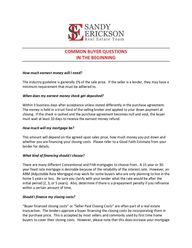
Return to flip book view
COMMON BUYER QUESTIONS IN THE BEGINNING How much earnest money will I need? The industry guideline is generally 1% of the sale price. If the seller is a lender, they may have a minimum requirement that must be adhered to. When does my earnest money check get deposited? Within 3 business days after acceptance unless stated differently in the purchase agreement. The money is held in a trust fund of the selling broker and applied to your down payment at closing. If the check is cashed and the purchase agreement becomes null and void, the buyer must wait at least 10 days to receive the earnest money refund. How much will my mortgage be? This amount will depend on the agreed upon sales price, how much money you put down and whether you are financing your closing costs. Please refer to a Good Faith Estimate from your lender for details. What kind of financing should I choose? There are many different Conventional and FHA mortgages to choose from. A 15 year or 30-year fixed rate mortgage is desirable because of the reliability of the interest rate. However, an ARM (Adjustable Rate Mortgage) may work for some buyers who are only planning to live in the home 5 years or less. Be sure you clarify with your lender what the rate would be after the initial period (2, 3, or 5 years). Also, determine if there is a prepayment penalty if you refinance within a certain amount of time. Should I finance my closing costs? “Buyer financed closing costs” or “Seller Paid Closing Costs” are often part of a real estate transaction. The lenders approve a buyer financing the closing costs by incorporating them in the purchase price. This is accepted by most sellers and commonly used by first time home buyers to cover their closing costs. However, please note that this does increase your mortgage
amount and decreases the amount of equity you may have in the home. The home will also need to appraise for the full purchase price. When should I lock in my interest rate? Many lenders require an accepted purchase agreement before they allow you to lock in on a rate. However, some will allow a verbal lock request over the phone based on their relationship with you or the agent. Please check with your lender for details. Is the purchase contingent on the sale of my current home? Determining whether your offer will be contingent or non contingent on the sale of your home is a very important factor in the purchase agreement. If you are planning to write your offer non contingent (without your home being sold), lender approval is required. Please review your options in detail with me. What is the seller’s property disclosure statement? Minnesota state law requires that most sellers complete a property disclosure statement (with some exceptions). This is to be honestly completed to the best of the seller’s ability if they lived in the property. Does the city require any city inspections on the property? The municipalities that require inspections are Bloomington, Crystal, Hopkins, Maplewood, Minneapolis, New Hope, Osseo, Richfield, Ramsey, St. Paul, St. Louis Park, Brooklyn Park, and South St. Paul. Most cities require repair and reinspection for hazardous items. Should I consult my tax advisor about this purchase? Yes, you should consult your tax advisor regarding potential capital gains tax or tax credits. Note: Anytime a homeowner sells a principal residence, they are entitled to an exclusion of gain of $250,000 for a single person or $500,000 for a married couple. The homeowner must own and occupy the residence for at least two out of the five years prior to the sale. Please feel free to discuss any of these items in detail with me. Thank you for your business.